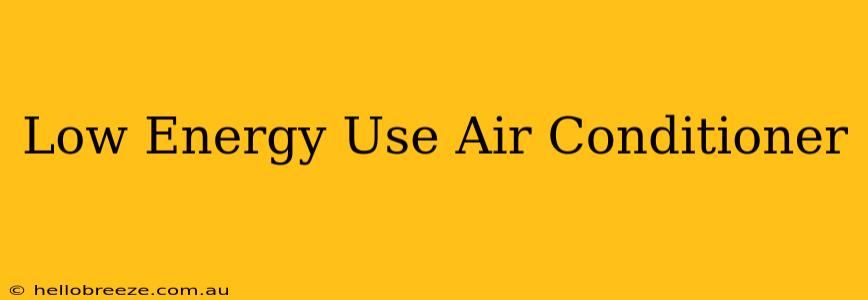Summer's heat can be brutal, but your energy bill doesn't have to be. Choosing a low energy use air conditioner is a smart investment that keeps you cool and saves you money. This guide will walk you through everything you need to know to find the perfect energy-efficient AC unit for your home.
Understanding Energy Efficiency in Air Conditioners
The key to finding a low energy use air conditioner lies in understanding its Energy Efficiency Ratio (EER) and Seasonal Energy Efficiency Ratio (SEER).
-
EER (Energy Efficiency Ratio): This measures the cooling output (in BTUs) per watt of electricity consumed. A higher EER indicates greater efficiency.
-
SEER (Seasonal Energy Efficiency Ratio): This is a more comprehensive rating, considering the average efficiency over the entire cooling season. A higher SEER rating signifies significantly lower energy consumption over time. Look for units with a high SEER rating, ideally above 16, for optimal energy savings.
Factors Affecting Energy Consumption
Several factors influence how much energy your AC unit uses:
-
Size: An improperly sized AC unit will work harder and consume more energy. A unit that's too small will struggle to cool your space, while one that's too large will cycle on and off frequently, wasting energy. Professional sizing is crucial to ensure optimal performance and energy efficiency.
-
Maintenance: Regular maintenance, including filter changes and professional servicing, dramatically improves efficiency and extends the lifespan of your AC unit. Cleaning or replacing your air filter every 1-3 months is a simple yet highly effective way to reduce energy consumption.
-
Insulation and Sealing: Poor insulation and air leaks allow cool air to escape and warm air to enter, forcing your AC to work harder. Proper home insulation and sealing are vital for maximizing the efficiency of your air conditioner.
-
Window Placement and Shading: Direct sunlight can significantly increase the cooling load. Using window coverings like blinds or curtains can reduce heat gain and lower your energy consumption.
Types of Energy-Efficient Air Conditioners
Several types of air conditioners are designed for energy efficiency:
-
Inverter ACs: These units use variable-speed compressors, adjusting their cooling power based on the room's temperature. This prevents energy waste associated with traditional on/off cycles.
-
Window Air Conditioners: Smaller and more affordable than central units, energy-efficient window ACs are a great option for individual rooms. Look for those with high SEER ratings.
-
Ductless Mini-Splits: These systems offer excellent efficiency and zoning capabilities, allowing you to cool specific areas of your home without wasting energy on unused spaces.
-
Central Air Conditioners: While larger and more expensive initially, high-SEER central AC units can offer significant long-term savings on energy bills.
Choosing the Right Low Energy Use Air Conditioner
Selecting the right AC involves careful consideration of your needs and budget. Here are some crucial steps:
-
Calculate your cooling needs: A professional assessment helps you determine the correct size for optimal efficiency.
-
Compare SEER ratings: Focus on units with high SEER ratings for maximum long-term savings.
-
Consider additional features: Look for features like smart thermostats, which can further enhance energy efficiency.
-
Read reviews: Check online reviews to gauge the reliability and performance of different models.
-
Factor in installation costs: Installation costs can vary depending on the type of unit and your home's configuration.
Beyond the Unit: Saving Energy with Smart Practices
Even the most efficient air conditioner won't reach its full potential without smart usage habits:
-
Programmable Thermostat: Utilize a programmable or smart thermostat to automatically adjust temperatures when you're away or asleep.
-
Proper Ventilation: Ensure adequate ventilation to prevent the buildup of moisture and improve cooling efficiency.
-
Regular Maintenance: Regular maintenance is key to preserving energy efficiency and extending the life of your system.
By understanding energy efficiency ratings, choosing the right type of AC, and adopting smart energy-saving practices, you can significantly reduce your energy bills while enjoying a comfortably cool home. Investing in a low energy use air conditioner is an investment in both comfort and cost savings.

